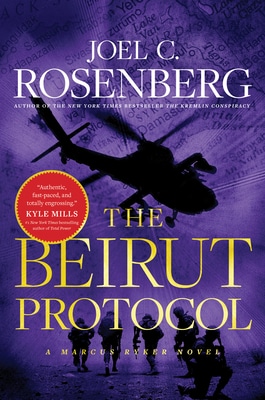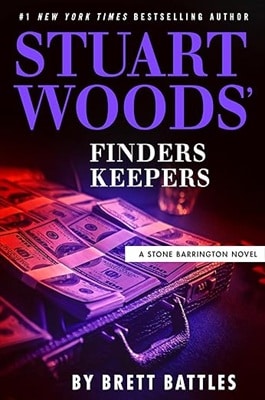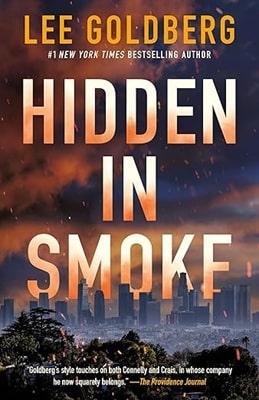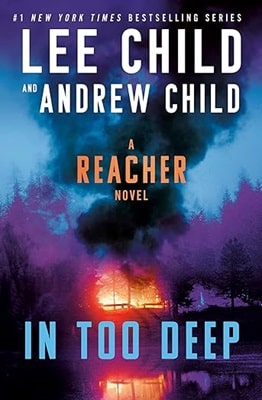
Q&A
Joel C. Rosenberg
Joel C. Rosenberg is the founder of The Joshua Fund and the New York Times best-selling author of The Last Jihad (2002), The Last Days (2003), The Ezekiel Option (2005), The Copper Scroll (2006), Epicenter (2006) and Dead Heat (2008) with more than 1.5 million copies in print. THE EZEKIEL OPTION was named by the ECPA as the Gold Medallion winner of the “Best Novel of 2006.”
Q. Your latest, The Beirut Protocol, Marcus Ryker gets captured behind enemy lines. What else are we in for? And what current events inspired this story?
Rosenberg: You’re right. I’ve actually been writing thrillers now for 20 years, but I’ve never written one in which my main character is captured and pulled into enemy territory. So that’s exactly where The Beirut Protocol begins. In the opening pages, Marcus Ryker – a Marine combat veteran of Afghanistan and Iraq and a decorated former U.S. Secret Service Agent – and his team are ambushed by a Hezbollah terrorist cell on the Israel-Lebanon border and taken captive.
It’s a terrifying prospect actually. I’d really worked hard in the previous three novels in this series on establishing who Ryker is, what his training and values and skill sets are, and why he’s now working for the Central Intelligence Agency. But I got intrigued with the question of how Ryker might handle himself if he was taken hostage. I’d already set him up as of the most effective clandestine operators in the Agency. But what if all of his strengths and skills were neutralized? What if his team was also captured? Then what? What would he do? And from where would he summon the strength not to give up but find a way to fight – maybe even to escape?
As The Beirut Protocol unfolds, I get to tell a very personal and intimate and close-quarters story of Ryker and his colleagues as they face interrogation and torture. They have no idea where they area, and no idea how to get free. Ryker is suddenly facing the horrifying prospect of certain death at the hands of a bloodthirsty enemy. The only good news is that his captors don’t seem to know who he is, or that the Iranian regime has put a $50 million bounty on his head.
At the same time, I get to zoom out and tell the big picture story. How would the Israeli military respond to a hostage taking on the Lebanon border? How would Hezbollah’s senior leadership respond? Would such an incident trigger the Third Lebanon War? How the White House would react? And what would the CIA do to get Ryker and his team back safely? And just for good measure, a throw in a few curve balls to keep even further off balance.
A few years ago, my family and I moved to Israel. We live in Jerusalem. And two sons of our four sons have served in the Israeli Defense Forces. One actually served briefly on the Lebanon border. The other served in a special forces unit. Plus, we have many Israelis who have served in a range of IDF units, as well as friends who are current and former high-ranking officers, high-ranking intelligence officials, even the current Minister of Defense. So, I’ve got a lot of people I can tap for research (though I didn’t actually ask my sons for their help since they were in active military roles while I was researching and writing the novel and I didn’t want to get them in trouble.)
One of the things that inspired the story was an event in 2006 in which a Hezbollah unit attacked an IDF patrol on the border. Several Israeli soldiers were killed. Several more were captured. And the Second Lebanon War erupted. In 34 days, Hezbollah fired 4,000 missiles at Israel. But today, senior Israeli officials tell me the Third Lebanon War could lead to Hezbollah firing 4,000 missiles a day – or more – at Israel. That’s a grim prospect. But it makes, I think, for a fascinating political thriller.
Q. Before you wrote thrillers, you worked as a political consultant for numerous well-known figures, including Steve Forbes and Benjamin Netanyahu. How did your experience in politics affect the kinds of books you write?
Rosenberg: Well, that’s true, but to be clear I was a failed political consultant. I helped Steve Forbes lose two presidential campaigns (1996 and 2000) and about $70 million of his five daughters’ inheritance money. In September of 2000, I was hired to serve on Netanyahu’s “comeback campaign” team. But that ground to a halt by December of 2000. And it took Netanyahu nine more years to “come back,” and I played no role whatsoever. So, it’s not like I had an illustrious or successful political career.
That said, working for these and other leaders did give me a lot more experience in Washington and Jerusalem than most people who sit down to write a political thriller, much less thrillers set in the Middle East. So, I think my years working in politics helped make my novels seem a lot more realistic and have more of an “insider” feel to them than if I’d never had met those leaders or worked in those roles.
Q. Famously, a number of world leaders read your work. Who among them surprises you the most? Have you ever gotten feedback that shocked you?
Rosenberg: Look, to be clear, I’m surprised that anybody reads my books. I certainly never imagined selling five million copies. And I absolutely never imagined that my novels would be read by people like Vice President Mike Pence, Secretary of State Mike Pompeo, former President George W. Bush, former CIA Director Porter Goss, former Delta Force Commander General Jerry Boykin, former senior White House advisor Jason Greenblatt, Jordan’s King Abdullah II, former Canadian Prime Minister Stephen Harper, former Israeli Interior Minister Natan Sharansky, former Israeli Deputy Foreign Minister Danny Ayalon, and many other American, Israeli, Arab and other foreign leaders, not to mention Members of Congress, governors, and other interesting people.
So, that’s been fun – learning that they’re reading and enjoying the books, but also meeting and getting to know most of these folks. Actually, I’ve met and built friendships with all of the ones I’ve mentioned except former President Bush. Our schedules have never quite worked out to make that happen, but he has sent me a number of kind notes about the books over the years.
Probably the most surprising was to learn in 2016 that Jordan’s King Abdullah had read The First Hostage, which is a novel in which ISIS terrorists try to assassinate him, blow up his palace and take over his kingdom. The next thing I knew, rather than banning me from the Kingdom of Jordan forever, the king was inviting my wife and me to come visit him for five days to get to know him and his senior military and intelligence advisors. That was absolutely fascinating, and set into motion a number of meetings over the years. I have the highest respect for King Abdullah and it’s been a thrill to know that he’s become a fan of my novels.
Q. Besides writing, you’re involved in significant charitable work. What can you tell us about that?
Rosenberg: Given that I write about wars and terror attacks and other traumas here in the Middle East, it seemed important to my wife and me to do everything we could to help care for those who actually are affected by war and terror and religious persecution in this region. So, in 2006 – just a few years after the publication of my first novel – Lynn and I founded The Joshua Fund. It’s a U.S.-based non-profit organization to bless Israel and her neighbors.
We’re Evangelical Christians, so we have been blessed to invest some of our own money we have earned from my books, as well as raise money from others including other Evangelicals, to care for the poor and needy, widows and orphans, Holocaust survivors, Iraqi and Syrian refugees, and so forth. We also invest in strengthening Christians who live in the region, helping churches and Bible colleges and other ministries that do important work in Israel, the Palestinian territories, and in five neighboring Arab countries – Lebanon, Syria, Jordan, Iraq and Egypt. Over the last 15 years or so, The Joshua Fund team has been fortunate to be able to invest about $50 million in such work, and it’s one of the most special things we get to be involved in.
Q. What are you working on now?
Rosenberg: I’m working on two projects right now – the next thriller in the Marcus Ryker series that will release in March 2022, as well as a non-fiction book that will release in September of this year, to mark the 20th anniversary of the al Qaeda terror attacks on America on September 11, 2001. That one is called Enemies & Allies: An Unforgettable Journey Inside The Fast Moving and Immensely Turbulent Modern Middle East. It’s full of exclusive interviews I’ve done over the last few years with the President and Vice President of the United States, the Secretary of State, two directors of the CIA, the President of Israel, and kings and crown princes, presidents and prime ministers throughout the Sunni Arab world.
I look at how we’ve dealt with past threats in the Middle East like al Qaeda and ISIS, and what new and even more serious threats are coming up over the horizon. And even more interestingly, at least to me, I take readers inside motorcades and palaces and my personal conversations with some of the most interesting and controversial and consequential leaders in this region.
Attitudes are really shifting in this part of the world. Sweeping, tectonic changes are underway. But most Americans aren’t aware of just how huge the changes are, or how such change will affect their lives. It’s been a fascinating project. I’m just finishing up the editing process now. I love writing novels, but it’s been exciting to work on a non-fiction book given all the drama underway in Jerusalem and Riyadh and Abu Dhabi and Cairo and Tehran.
Joel C. Rosenberg's Latest
The Beirut Protocol
A game-changing peace treaty between Israel and the Saudis is nearly done. The secretary of state is headed to the region to seal the deal. And Special Agent Marcus Ryker is leading an advance trip along the Israeli-Lebanon border, ahead of the secretary’s arrival.
But when Ryker and his team are ambushed by Hezbollah forces, a nightmare scenario begins to unfold. The last thing the White House can afford is a new war in the Mideast that could derail the treaty and set the region ablaze. U.S. and Israeli forces are mobilizing to find the hostages and get them home, but Ryker knows the clock is ticking.
When Hezbollah realizes who they’ve captured, no amount of ransom will save them–they’ll be transferred to Beirut and then to Tehran to be executed on live television.
In the fourth installment of Rosenberg’s gripping new series, Marcus Ryker finds himself in the most dangerous situation he has ever faced–captured, brutalized, and dragged deep behind enemy lines.
Similar Thrillers
Advertisement







